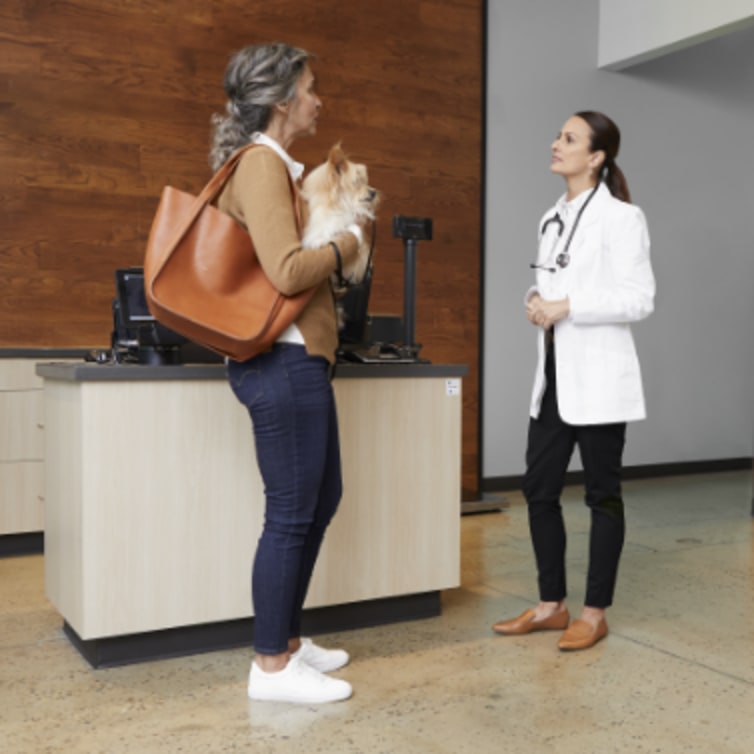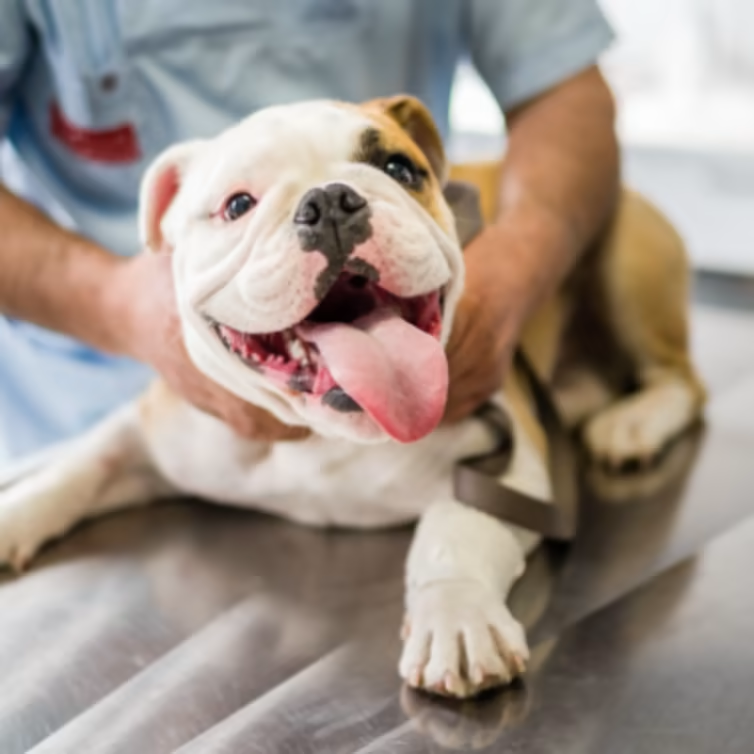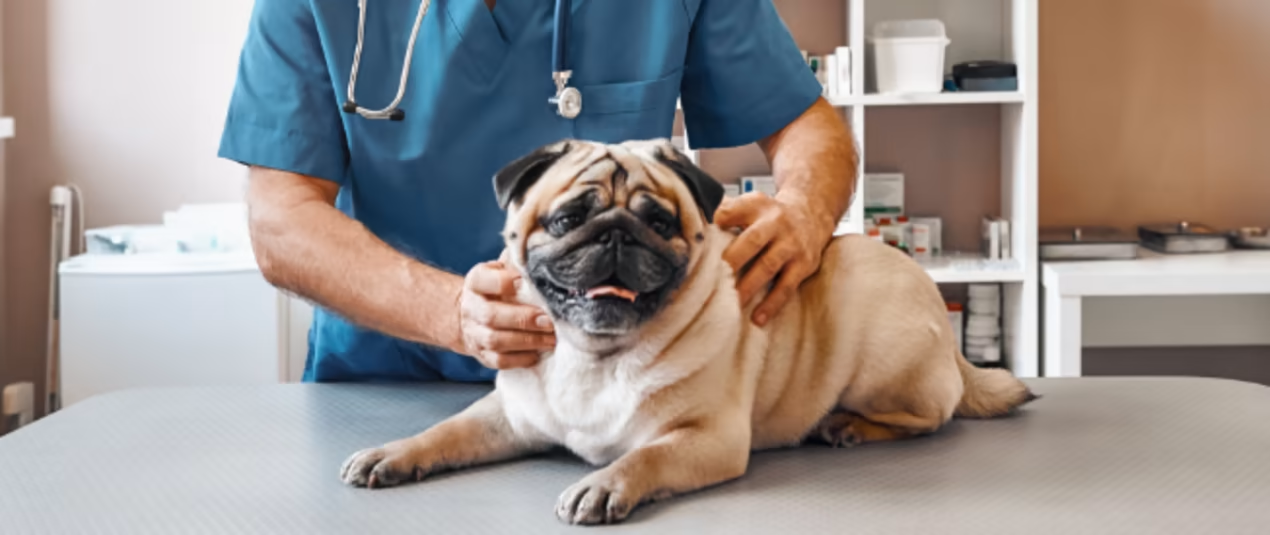Two Easy Ways to Start Earning Rewards!
Become a member today!Members-only pricing and offers, personalized care notifications, Vital Care points back on every purchase and more!Become a credit card member today!
Earn 2X Pals Rewards points at Petco
when you use Petco Pay!APPLY NOWLearn More About Petco Pay Benefits
Table of Contents
The ins and outs of getting your dog (or puppy) vaccinated
Ensuring the health and wellness of your pup goes beyond buying them nutritious dog food and making sure they get their daily exercise. To help them stay their best, they also need to stay up to date on their vaccinations. Contact your neighborhood Vetco Vaccination Clinic or our full service Vetco Total Care to find out what your pup needs and how much it will cost, and to make an appointment.
This article focuses on vaccinations, but it’s important to remember when budgeting for vet care costs, that your dog’s preventive care needs don’t stop with vaccinations and puppy shots. Heartworm testings, prescription medication for heartworm and other internal parasites, flea and tick prevention, and fecal testing and deworming also need to be factored in to your dog's wellness plan.
How do vaccines work, and how do they help my dog?
Vaccines work by priming the immune system to produce antibodies that identify and destroy these pathogens before they cause any disease. The benefits of preventing these diseases far outweighs the risk of giving these vaccines. For example, Canine parvovirus, canine distemper, infectious canine hepatitis are highly contagious and frequently life-threatening diseases. Puppies have an elevated risk of getting these diseases as their immune system hasn’t been exposed to these pathogens. For the immune system to battle these viruses if your puppy is exposed, it is important to appropriately vaccinate them.
Your pet may have some tenderness at the vaccine site, they may not want to eat their normal amount and they may be sleepy. True anaphylactic reactions are rare, and usually they resolve with veterinary intervention. Partner with your veterinarian to discuss the risk of vaccination with your pet and to determine what are the appropriate vaccines for your pet based on your lifestyle i.e. active hiking, dog parks, boarding etc.

What Vaccines does my dog need?
The American Animal Hospital Association (AAHA) splits vaccines into two categories: core and non-core.
Core Vaccines for Dogs
Core vaccines are those that every dog needs and includes:
Non-core Vaccines for Dogs
Non-core dog vaccinations are determined by where you live and your lifestyle. For example, a dog who has regular grooming appointments, goes to doggy day care, plays with friends at the dog park and sometimes boards in a kennel may need non-core dog vaccinations that a dog who does none or only some of those things will need. Consult your Petco veterinarian about what vaccines are suitable for your dog.Each of these types of vaccines are explained more thoroughly in the puppy and adult dog vaccination schedules below.
Most Common Dog Vaccinations
These are the most common vaccinations given to dogs. Consult with your veterinarian to determine the right vaccine schedule based on your lifestyle and risk.
Rabies is spread to unvaccinated animals through the saliva of infected animals, most commonly skunks, raccoons, coyotes and foxes. In unvaccinated animals, rabies causes muscle spasms, paralysis and death—and once symptoms appear, there is no viable treatment. Its lethality and ease of transmission are why most states require a rabies vaccine for dogs by law. Even if your state doesn’t legally require it, every dog should be vaccinated for rabies unless your veterinarian recommends against vaccination for medical reasons.
How often does my dog need a rabies shot?
Rabies is often a routine part of puppy vaccinations and can be given as early as 12 weeks or any time after. Your dog will need a booster one year later and then boosters every three years after that.The DHPP vaccine for dogs is a combined vaccination for distemper, adenovirus, parainfluenza and parvovirus. Distemper affects dogs’ respiratory and nervous systems and can cause coughing, sneezing and neurological problems. This disease is often fatal. The adenovirus vaccine protects dogs against both CAV-2—which can cause kennel cough—and liver infections caused by CAV-1.
The parainfluenza vaccine protects against another strain of kennel cough.
Parvovirus is a deadly disease that commonly affects puppies. It can cause vomiting, diarrhea and often death, even with aggressive treatment. It’s also highly contagious, so pet parents should keep young dogs out of communal areas until two weeks after they’ve had all puppy vaccinations and boosters.
The Bordetella vaccine protects dogs from two strains of kennel cough but not all of them. It’s commonly referred to as the “kennel cough vaccination.”
Bordetella isn’t always fatal, but it can be. This disease causes terrible coughing and vomiting and can be highly contagious. That’s why this vaccine is often required for dogs who are boarded or attend day care. It’s recommended for any dog who is frequently in communal areas with other dogs.
Canine influenza is another virus that can cause kennel cough, although it’s not as common as Bordetella, parainfluenza or CAV-2. It can be very contagious, however, and pet parents whose pups spend time in communal environments should consider this dog vaccination.
The leptospirosis "lepto" vaccine for dogs became well known relatively recently. Leptospirosis is carried by rodents and other wildlife and is commonly transmitted through contaminated standing water or mud—typically puddles or ponds. It can cause vomiting, lethargy, increased thirst and fever. Luckily, it can be treated, and most dogs make a full recovery. Still, if you live in a high-risk area with stagnant water and lots of wildlife, the lepto vaccine may be recommended for your pup.
The Lyme vaccine for dogs is another vaccination whose need is typically determined by where you live. Lyme vaccinations are more common in the northeastern United States—where the disease is most common—and the upper Midwest and mid-Atlantic states. Reported cases of Lyme disease are increasing across the country, so this may be worth getting if your pet spends lengthy amounts of time outdoors.
Lyme disease can cause inflammation of the joints, fever, enlarged lymph nodes, sensitivity to touch and labored breathing. It’s usually not fatal and can be treated on an outpatient basis, but in some cases, it can become a lifelong, recurring condition. Flea and tick prevention can be integral to preventing this disease, but the Lyme vaccine can provide an extra layer of protection.
How often does my dog need to be vaccinated?
Which vaccines your dog will need each year depends on their age, vaccine history and medical history. Your Petco vaccination veterinarian can help make the appropriate plan for your dog.
Puppies will need to come for their first veterinary visit at between 6-8 weeks. We will vaccinate for their first DHPP at this time. Then every 3-4 weeks we will schedule a vaccine booster appointment where they will receive an additional DHPP, start leptospirosis, influenza, and Bordetella based on their risk. Their final DHPP booster will be between 14-18 weeks and the rabies vaccination is usually given after they are 16 weeks of age (can vary by state). One year after the last booster, all of the vaccines are given again and will either be protective for 6 months, 1 year to 3 years depending on the vaccine.
New Puppy
If you’re bringing home a new puppy, you should try to minimize exposure to other pets and common areas for dogs (i.e. dog parks) until they are complete their vaccine series which is usually around 16-18 weeks. Please bring any vaccine history with you to your appointment as this will aid the veterinary team to make the appropriate choice for booster vaccines needed and the frequency of subsequent vaccines.New Adult Dog
For an adopted adult dog, please attempt to get any vaccine history as well so that we can follow up with any additional vaccines needed.How are dog vaccines administered?
Our veterinary teams want to minimize any fear or pain associated with vaccination. We want to assure your dog wants to keep coming back to see us! Vaccinations are administered subcutaneously (under the skin), usually on the proximal limbs or scruff region. Some vaccines are administered as a liquid either orally or in the nose to get local antibody development in these regions. Your veterinary team may hold your dog to assure they don’t wiggle too much and they may provide some treats to distract them from the vaccination.
Are vaccines painful to dogs?
Your pet may experience slight discomfort from the vaccine. We try to minimize this by having proper restraint and distracting your pet with treats or snuggles.

Puppy Vaccine Schedule
Puppy vaccinations are usually administered in multiple doses that might be anywhere from two to four weeks apart. It can be crucial to your dog’s future health to stay current with their puppy vaccination schedule.
| Age | Recommended Vaccine |
|---|---|
| 6–9 weeks | Combination Vaccine/DHPP** without leptospirosis |
| 9–12 weeks | Second Combination Vaccine/DHPP** |
| 12–16 weeks | Rabies (based on local and state laws) Third Combination Vaccine/DHPP** with leptospirosis where this is a concern |
| Variable: timing determined by your veterinarian and local laws | Additional vaccinations to ask about: Bordetella Canine Influenza Rattlesnake Coronavirus Lyme Boosters if given and where there is concern: Coronavirus DHPP Leptospirosis Lyme Disease Rabies |
**Based on risk, puppies should receive the DHPP vaccine every two to four weeks until they are 16 weeks old (a minimum of three doses).
Adult Dog Vaccination Schedule
Adult vaccinations often depend more on when your dog was last vaccinated than their age.
| Vaccination | Timeline |
|---|---|
| Rabies | Second vaccination one year after the first Boosters every three years after that |
| DHPP | Booster vaccination one year after last dose Boosters every three years after that |
| Bordetella | Annual or 6-month boosters, or as needed |
| Lyme Disease | Annually for dogs in high-risk areas |
| Leptospirosis | Annually for dogs in high-risk areas |
| Canine influenza | Annually if recommended by your veterinarian |
If you have any questions about puppy vaccination schedules or dog vaccinations in general, consult your Petco veterinarian. When you’re ready to bring your dog in for a booster or a round of puppy shots, Petco is here to help. Find a vaccine clinic at a neighborhood Petco Pet Care Center or a full service Vetco Total Care near you.
FAQs About Dog Vaccines
Any pet may be susceptible to a vaccination reaction, unfortunately we are unable to predict when a pet may react. In general, the following breeds tend to be at a higher risk of vaccine reaction:
After your vaccination appointment, majority of pets will not experience any symptoms that need care. If your pet is sore at the vaccination site, you can place a cold compress for 10 minutes three times a day. If your pet is tired, you may just minimize activity for 24 hours until they are back to their normal selves. If you do see symptoms such as pain, swelling, discharge at the site, vomiting, diarrhea, swollen face or hives these could be a sign of a vaccine reaction and your pet should be seen by your veterinarian.
Some common side effects that may be seen after vaccination include: soreness at the vaccine site, mild decrease in appetite and mild sleepiness. If you do see symptoms such as pain, swelling, discharge at the vaccination site, vomiting, diarrhea, swollen face or hives these could be a sign of a vaccine reaction and your pet should be seen by your veterinarian. True anaphylactic reactions are rare, and usually they resolve with veterinary intervention
If your pet is sick please see your veterinarian to determine if diagnostics and treatment are indicated. Likely, the vaccinations will be postponed until your pet is back to normal again
Puppy Breeding Supplies
Pet Health Solutions
Presents For Puppies
Heartworm Flea And Tick Prevention For Puppies
Pet Fresh Puppy Food
Greyhound Puppy Products
Animal Supplements
Best Puppy Care Products
Best Dental Chews For Puppies Under 6 Months
Adult Dog Food Cases
Newfoundland Puppy Supplies
Hill's Healthy Advantage Puppy Large Breed
Adult Dog Care Products
Dog Foods With Antibodies
No Soy Puppy Foods
Dog Food Cans
Puppy Weaning Food
Dewormer Chewables for Pets
Senior Dog Multivitamin
Pet Medical Supplies
Fera Pets Dog Health & Wellness
Fera Pets Dog Vitamins & Supplements
Fera Pets Cat Health & Wellness
Fera Pets Dog Food
Petco
Fera Pets Cat Vitamins & Supplements
Fera Pets Dog Food Toppers & Broths
Fera Pets
RuffLand Performance Kennels
HEMPZ Dog Grooming Supplies
PawsPik Dog Bowls & Feeding Supplies
Multipet International
Higgins Pet Clearance
PawsPik
Aqua Natural Pet Clearance
PawsPik Dog Waterers, Fountains & Accessories
PetShop by Fringe Studio Fall Faves
JIBY Dog ID Tags & Accessories
Outward Hound
HEMPZ Dog Shampoos, Conditioners & Sprays
What is the proper age of a puppy for his first vaccine
Can a puppy be vaccinated at 5 weeks
Can I give my puppy vaccines myself
how do i schedule an appointment to get my puppy his first vaccinations
What are the vaccines a dog need
What shots dose my puppy need
How much would vaccinations cost for my puppy?
When I can get my puppies vaccine shots ? My puppies is 6 week pld
how much is the vaccine shots for a puppy?
trying to find the best puppy food for a weimaraner and a place to get next round of puppy shots
I'm trying to see what shots are needed for my puppy next and when ? Vaccination history Date Vaccine Product lot & exp. Route/site Vaccinated by Supervising veterinarian Notes 03/25/2017 DHPP Nobivac Canine 1-DAPPv (Merck) 02121707A 04/30/2018 SQ Right front leg Jessie Warhoe 03/25/2017 Adenovirus, Bordetella (Kennel Cough), Parainfluenz Nobivac Intra-Trac3 (Merck) 00541367C 09/12/2018 IN Nose Jessie
Vaccination and food for 5 weeks beagle puppy

